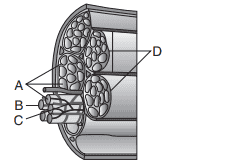1. Which muscle is not under direct control of nervous system?
a) Skeletal (Striated muscles)
b) Smooth (Non-striated muscles)
c) Cardiac muscles
d) All of these
Explanation: Cardiac muscles
2. Muscle fibre is a
a) Anatomical unit of muscle
b) Physiological unit of muscle
c) Biochemical unit of muscle
d) None of these
Explanation: Muscle fibre is a anatomical unit of muscle.
3. Identify A, B, C and D in the given figure.

a) A–Sarcolemma, B–Blood capillary, C–Fascicle (muscle bundle), D–Muscle fibre (muscle
cell)
b) A–Blood capillary, B–Muscle fibre (muscle cell), C–Fascicle (muscle bundle),
D–Sarcolemma
c) A–Sacrolemma, B–Muscle fibre (muscle cell), C–Fesicle (muscle bundle), D–Blood
capillary
d) A–Muscle fibre (muscle cell), B–Sarcolemma, C–Blood capillary, D–Fascicle (muscle
bundles)
Explanation: A–Muscle fibre (muscle cell), B–Sarcolemma, C–Blood capillary, D–Fascicle (muscle bundles)
4. Each organized skeletal muscle in our body is made up of a number of muscle bundles or
fascicles held together by a common collagenous connective tissue layer called
a) Tunicine
b) Fascia
c) Pellicle
d) Capsule
Explanation: Fascia
5. Select the correct matching from the following:
a) Plasma membrane of muscle fibres – Sarcolemma
b) Cytoplasm of muscle fibres – Sarcoplasm
c) Endoplasmic reticulum of muscle fibres – Sarcoplasmic reticulum
d) All the above
Explanation: All the above
6. Sarcoplasmic reticulum is a storehouse of which ion
a) \[Ca^{2+}\]
b) \[Na^{+}\]
c) \[K^{+}\]
d) \[Fe^{2+}\]
Explanation: \[Ca^{2+}\]
7. Sarcolemma is a membrane found over
a) Nerve fibre
b) Cardiac muscle
c) Skeletal muscle fibre
d) Heart
Explanation: Skeletal muscle fibre
8. The functional unit of the contractile system in the striped muscle is
a) Z-band
b) A-band
c) Myofibril
d) Sarcomere
Explanation: Sarcomere
9.Contraction of a muscle is caused by
a) Myosin
b) Actin
c) ATP
d) Actomyosin
Explanation: Contraction of a muscle is caused by actomyosin
10. The dark bands (A-bands) of a skeletal muscle are known as
a) Isotropic bands
b) Anisotropic bands
c) Intercalated disc
d) Cross bridges
Explanation: The dark bands (A-bands) of a skeletal muscle are known as Anisotropic bands.